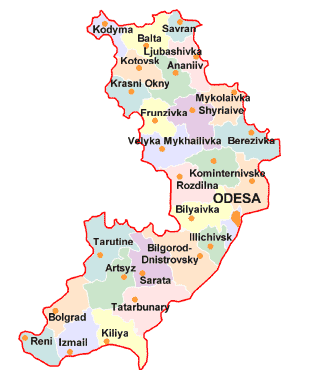It appears Giya Lordkipanidze, one time Deputy Interior Minister in Georgia, and now Odessa Oblast Police Chief, will imminently have a new set of department heads for the Oblast and the city.
Appointed as Deputy Chief of Police Odessa City, is Alexander Martynov. Until recently Colonel Martynov was head of the serious crime investigation department of Mykolaiv Oblast.
The new head of the City Police criminal investigation department is Major Taras Pedak, previously employed within the Serious and Organised Crime department for Mykolaiv Oblast, heading the terrorism and extremism team there.
With regards to Odessa Oblast, (rather than the city of Odessa), Lieutenant Colonel Stanislav Baklanov who headed the Mykolaiv Oblast Serious and Organised Crime department is now to become the Deputy Police Chief of Odessa Oblast.
Vitaly Vdovichenko will become Deputy Chief of the Oblast criminal investigation department, having served until now within the Mykolaiv Serious and Organised Crime department.
Mykolaiv it appears, now has vacancies to fill following these officers successful applications for the above roles in Odessa.
All very good - insofar as it goes.
Importing experienced investigators, as these men clearly are, from a neighbouring Oblast is a fairly reasonable thing to do. They arrive without any nefarious ties to the local, and increasingly entrenched nefarious Odessa elites, and yet possess a fairly good understanding of the Oblast’s geography, as well as local, regional and national policing issues from day one in their new jobs.
If, as the saying goes, a fish rots from the head downwards, then a new head may if not stop the rot entirely, at least slow the decay in the body, allowing the body to be effectively treated.
Thus we return to the tired but nonetheless still critically relevant 3 themes that dominate the past months within this blog that are vital to the reformation of both Oblast and Ukraine - rule of law, institutional/administrative structure and sustainability.
New heads to the regional institutional policing structure does not equate to a structure that is designed for quality and/or efficient policing. There are a number of policing units/divisions/departments that can have their specialisms (and officers) incorporated into others reducing management requirements and associated turf wars over areas of competency overlaps and budgetary demands.
As Odessa under its current Governor seems extremely keen to host as many pilot projects as possible, then perhaps it is the Oblast (given the very watchful eyes of external and influential supporters that currently gaze upon it) to restructure its Oblast policing as yet another pilot project.
There is a pressing requirement to address the individual policing needs of various districts within the Oblast, and where necessary to create temporary district teams to address certain issues robustly before dissolving those teams once those issues are addressed.
In short, the “hot spots” and “hot policing priorities” of Ismail are not going to be the same as those in Liubashivka.
If, for example, juvenile crime is a major problem in Illichovsk, and agricultural theft is a problem in Brezivka, then clearly a bespoke police response is required to deal with those specific issues in a direct, focused, and timely way.
Thus a streamlined, efficient policing structure (compared to that which currently operates) is required, but one that is also flexible enough to deal with, and be seen to deal with, diverse local issues in a very timely way.
Local area policing plans are both preventative, responsive, and also bespoke to the local area. They should form part of the Oblast policing plan. The regional plan sets out the policing priorities within the Oblast and identifies the specific areas raised in LAPs.
That Oblast plan should be a publicly available document, for policing occurs (best) with the consent (and understanding) of the constituency. Society is more supportive when it understands what any policing effort is trying to do - particularly where they actually live and the local concerns it seeks to address.
Structure and sustainability.
Nevertheless, the introduction of police chiefs that are not contaminated by the local elites (yet) is a welcome move.
Unfortunately the swift replacement of local prosecutors seems somewhat more difficult for the Oblast due to a distinct lack of local applicants without potentially problematic associations. It is perhaps necessary to cast (and actively promote) a wider net once again.
Then there is the issue of the courts - no doubt subject to numerous future entries depending upon the outcome of Constitutional change.
